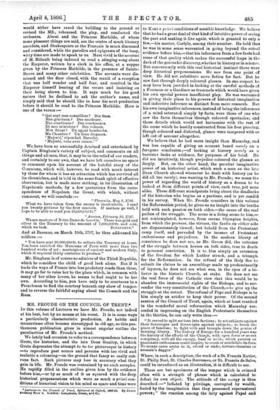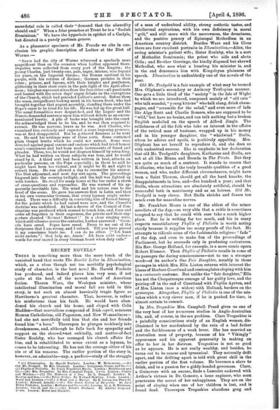MR. FROUDE ON THE COUNCIL OF TRENT.* IN this volume
of Lectures we have Mr. Fronde, not indeed at his best, but by no means at his worst. It is in some ways a particularly characteristic production. As habits and mannerisms often become stereotyped in old age, so this pos- thumous publication gives in almost angular outline the peculiarities of Mr. Froude's method.
We lately had occasion to refer to a correspondence between Grote, the historian, and the late Dean Stanley, in which Grote deprecates the attempt to be too picturesque in history —to reproduce past scenes and persons with too vivid and realistic a colouring—on the ground that fancy so easily out- runs fact. Such pictures may lose in accuracy what they gain in life. Mr. Fronde was restrained by no such scruples. He rapidly filled in the outline given him by the evidence before him,—or by as much of it as squared with the deep historical prepossessions which were as much a priori con- ditions of historical vision to his mind as space and time were • Lectures on the Council of Trent, delivered at Osford, 1895-93. By James Anthony Prim "e. London: Lonmnano. Green, and O. to Kant a priori conditions of sensible knowledge. We believe that he had a great deal of that kind of intuitive power of seeing the past and making it live again, which is granted to only a few,—his master, Carlyle, among their number. He held that he was in some sense warranted in going beyond the actual evidence before him,—that his inferences from a few facts bad some of that quality which makes the successful leaps in the
dark of the genius for discovery,whether in history or in science. But concurrently with this real historical instinct there were deep historical prepossessions. He saw from one point of view. He did not substitute mere fiction for fact. But he saw fact through deeply coloured glasses. In one respect be may have been justified in looking at the careful methods of a Freeman or a Gardiner as trammels which would have given his own special powers insufficient play. He was warranted in giving their place to his powers of historical imagination and inductive inference as distinct from mere research. But his own imaginative inferences, instead of being the inferences of a mind saturated simply by facts, were those of one who saw the facts themselves through coloured spectacles; and those details which would not harmonise with the rest of the scene which he hastily constructed from his first piercing, though coloured and distorted, glance were tampered with or left out of account altogether.
We believe that he had more insight than Macaulay, and was less capable of giving an account based merely on a foregone conclusion ;—of looking at history merely as a barrister looks at evidence, for purposes of his brief. He did see intuitively, though prejudice coloured the glasses so deeply. But, on the other hand, the peculiar imaginative power of an historical artist, which such a man as the late Dean Church showed whenever he dealt with history (as he
did all too rarely), was wanting to Mr. Froude; we mean the power of regarding the world of history as a drama to be looked at from different points of view, each true, yet none alike. These different standpoints bring about the deadlocks of the historian who begins as a partisan, and is yet candid in his survey. When Mr. Fronde considers in this volume the Reformation period, he gives ne no insight into the truths held with such passion on both sides,—the cause of the real pathos of the struggle. The scene is a living scene to him,— not contemplated, however, from serene Olympian heights, from which the prowess, the virtues, the faults on either side are dispasbionately viewed ; but beheld from the Protestant camp itself, and pervaded by the incense of Protestant enthusiasms and prejudices. In the modern liberty of
conscience be does not see, as Mr. Green did, the outcome of the struggle between heroes on both sides, true to death to personal conviction. It is to him simply an extension of the freedom for which Luther struck, and a triumph. for the Reformation. In the refusal of the Holy See to. submit its claims to an assemblage made up predominantly of laymen, he does not see what was, in the eyes of a be-
liever in the historic Church, at stake. He does not see the real force of the Catholic view that this would be to
abandon the immemorial rights of the Bishops, and to sur- render the very constitution of the Church,—to give up the struggle at the outset. The refusal of Pope and Bishops is to him simply an artifice to keep their power. Of the second session of the Council of Trent, again, which at least resulted
in the wonderful moral reformation which Macaulay sue.
ceeded in impressing on the English Protestants themselves in the thirties, he can only write thus:— "It served to split nai ions into factions ; to set subjects against their Sovereigns and Sovereigns against subjects ; to break the. peace of families ; to fight with and trample down the genius of dawning liberty. The history of Europe for a hundred years was the history of the efforts of the ChurTh, with open force or secret conspiracy, with all the energy, base or no:,1e, which passion ox- passionate enthusiasm could inspire, to crush or annihilate its foes. No means came amiss to it, sword or stake, torture-chamber or assassin's dagger."
Where, in such a description, the work of a St. Francis Xavier, St. Philip Neri, St. Charles Borromeo, or St. Francis de Sales, could be introduced as an illustration, it is difficult to see.
These are but specimens of the temper which is evinced often with a strength of phrase which is calculated to defeat its own object. The attitude of the c'ergy is thus described :—" Inflated by privilege, corrupted by wealth, fooled by the imagination that they possessed supernatural powers ; " the reaction among the laity against Papal and sacerdotal rule is called their "demand that the absurdity should end." When a friar preaches at Trent he is a " foolish Dominican." We have the hyperbole in epithet of a Carlyle, but directed in a purely partisan groove.
As a pleasanter specimen of Mr. Fronde we cite in con- clusion his graphic description of Luther at the Diet of Worms:— "Never had the city of Worms witnessed a spectacle more magnificent than on the occasion when Luther appeared there. Deputies were collected from every part of the Empire; the young Charles, just twenty-one, pale, eager, intense, wise beyond his years, on the Imperial throne ; the Roman cardinal in his purple, with his retinue of divines ; German prelates in their robes ; princes, and barons, with their knights and gentlemen, glittering in their steel coats in the pale light of the April after- noon ; burgher representatives from the free cities—all passionate and heated with the seven days' angry debate on the corruptions of the Church, which had preceded Luther's arrival. Before them the mean, insignificant-looking monk in his brown frock, who had brought together that august assembly, standing there under the Pope's curse to be tried for his life. He was led up the great ball The usual formalities were despatched, and the Legate and the Nuncio demanded sentence upon him without debate as an excom- municated heretic. A pile of books was brought into the court He acknowledged them to be his, and he was then required tc retract. He was nervous, brave as he was. And Charles, who examined him curiously and expected a more imposing presence, was at first disappointed. But he gathered firmness as he went on. He said his writings were of three sorts. Some contained plain Gospel truths which he could not retract. Some were directed against papal canons and customs which had tried honest men's consciences and bad been made instruments of fraud and plunder. These, too, he would not disgrace himself by retracting. What he had written on those subjects was true, and he would stand by it. A third sort had been written in heat, attacks on particular persons, on the Pope especially ; in these he said he might have been too violent, and it might be fit and right to retract them. He was allowed a day to reconsider his answer. The Diet adjourned, and next day met again. The proceedings lingered into the evening twilight, and the hall was lighted up with torches. He stood for many hours at the bar under a storm of cross-questions and reproaches. He was warned of his ap- parently inevitable fate. His mind and his nature rose to the level of the scene. He gave his answers first in Latin and then in his own vernacular German, that every layman might under- stand. There was a difficulty in convicting him of formal heresy, for the points which he had raised were new, and the Church's doctrine was undefined. At last a decree of the Council of Con- stantine was produced which seemed to touch him, and, form and order all forgotten in their eagerness, the priests and their sup- porters shouted ReIract ! Retract ! ' In a clear ringing voice, which still vibrates across the centuries, Luther answered : Coun- cils have erred. Popes have erred. Prove to me out of the Scriptures that I am wrong, and I submit. Till you have proved it my conscience binds me. I can do no other. [" Ich kann nicht anders."] God help me. Amen.' Ich kann nicht enders— words for ever sacred in every German heart when duty calls."



































 Previous page
Previous page